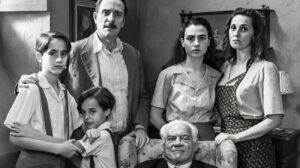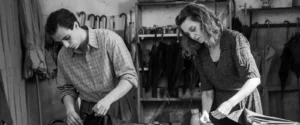How can a film about inequality and violence against women promote reflection, move us, make us laugh – without undermining the seriousness of the events – and leave the cinema with hope and confidence in a better future? The Italian filmmaker, Paola Cortellesi, achieves this difficult combination in her film “We Will Always Have Tomorrow”, a story of salvation and hope that appeals to the ethical power of education to promote together, men and women, equality and eradicate cruelty in the couple. Cortellesi pays tribute to silent feminism, small daily and anonymous conquests, on the path towards a more just and humane civilization that puts personal dignity at the center.
The chosen historical moment, a look and a neorealism aesthetic at the service of mercy—in the wise expression of María Zambrano—and the humorous cynicism of the Italian commedia that, without diminishing the magnitude of the narrated events, facilitates reflection, are essential keys to capture the depth of the message of Paola Cortellesi’s debut film on a topic as sensitive and transcendent as the systematic violence against women and objectification in marriages from other times and the long road towards equality, the end of suffering and respect mutual relationship that, even today, cannot be considered settled.
The Italian filmmaker sets the plot of the film We’ll Always Have Tomorrow, filmed entirely in black and white, in post-war Rome (1946). Delia, the main character played by Cortellesi herself, is married to Ivano (Valerio Mastrandea), a man who takes advantage of any opportunity to use violence against her and who only respects her father, Ottorino (Giorgio Colangeli), a despotic old man, whose care Delia is in charge of, and which justifies in family and social tradition and convention the use of cruelty to subjugate women. The roles of wife and mother define Delia; she unconsciously and selflessly accepts the life she has had to live.
The protagonist fights every day to raise her three children with poorly paid jobs: she sews for a haberdashery, washes the sheets of wealthy families, gives injections at home and fixes umbrellas. She only wants a good marriage for her eldest daughter, Marcella (Romana Maggiora), and she sets aside some of the money she earns to buy her, with her back to her husband, a new wedding dress. The young woman is engaged to a boy from a bourgeois family, Giulio (Francesco Centorame), and she sees in marriage the opportunity to escape from a family that embarrasses her. The only relief in Delia’s life is her friendship with Marisa (Emanuela Fanelli) who does not miss the opportunity to make her aware, with extraordinary kindness and tenderness, of her unhappy life and the suffering of her marriage to Ivano. Her daughter Marcella does it in a more hurtful way, moved by the terror of hearing from her room the daily beatings of her mother. “You have no dignity. Can’t you see that you’re a doormat? You don’t count for anything. Why don’t you leave?” She comes to reproach the young woman, with the intention of forcing her mother’s rebellion.
 An enigmatic letter and Delia’s evidence
An enigmatic letter and Delia’s evidence
However, it will be a mysterious letter – the origin of an unexpected and surprising ending that the viewer must discover – that will, in part, transform the identity of the protagonist and give her the courage necessary to radically change the initial plans and imagine a better future not only for her, but for Marcella as well. Indeed, the letter linked to the exciting, instructive and hopeful ending, is related to recovering one’s voice and exercising the right to narrate one’s own life, in a context in which women were educated in absolute obedience, and it was considered a provocation to reflect about one’s own condition. In fact, the film abounds with endless “shut up”, “you’re useless”, “you don’t understand anything”, “your problem is that you talk too much” or “you should be quiet with your mouth tightly closed”.
However, apart from the enigmatic missive, there is something else that contributes in a devastating way to Delia’s empowerment. She discovers, coincidentally, in a conversation between Marcella and Giulio, evidence of the risk to her daughter’s happiness in that future marriage and senses the danger of repeating the history of abuse and family domination. While Delia sews, she can hear Giulio ask Marcella why she has put on makeup to go to work and warns her that when they get married, she will no longer work and will only dress up for him “because you are mine, understand?”
An education together and hand in hand
There are film narratives that do not allow half measures. In this sense, the message of Paola Cortellesi’s film is an invitation to walk together and hand in hand, men and women, to combat inequality and violence. The ethical power of education, capable of transforming and improving identity, through the development of values closely related to higher forms of humanity, is the proposed path, in order to change a distorted mentality that confuses dominance and possession with love and that is the cause of many violent deaths.
The film flatly rejects feminist expressions that, without distinction, generally criminalize men, turning them into an enemy to be defeated. Thus, Ivano’s violence is contrasted with true relationships of encounter, love and equality in other couples such as that of Marisa—Delia’s close friend—with Peppe; to the kindness and tenderness of Nino, an old boyfriend of the protagonist with whom she talks from time to time; and even the empathy of William, an American soldier who offers to help her. The film, full of good men, from beginning to end, is an invitation to the awakening of conscience and collective commitment to a more just and humane civilization focused on the defense of the dignity of each person.
Cortellesi’s exercise of mastery and cinematographic ethics makes it possible for a film with such a complex and painful theme to become a story of salvation and hope that hits the hearts of viewers, without false goodwill or naivety, but rather embracing a reality not exempt from naturalized difficulties and inertia that should be channeled.

The director takes extreme care to distract the viewer with details about the force of the blows or wounds and chooses in a creative and original way to represent the attacks as a tragic dance of two, a cyclical ritual between Ivano and Delia, in which he hits her, then asks for her forgiveness, and she submits and ends up excusing him for “the nerves of having lived through two wars.”
Ode to silent feminism
On the other hand, numerous scenes in the film constitute a moving tribute to the anonymous heroines who, with their small daily achievements, have contributed to the emancipation of women. Many, from submission and meekness, educated as they were to obey, with their mouths closed, their father, brothers and husbands, did not stop building, even silently, a better future for their daughters.
In the historical moment chosen by Paola Cortellesi, after World War II, Italian women were able to vote for the first time. The film portrays how many did so with the hope of contributing to a better civilization and, to do so, they decked themselves in their best dresses and erased the lipstick from their lips so as not to invalidate the voting ballots that they kept as if they were love letters. Although this tribute goes beyond territorial limits to recognize the epic journey of millions of women towards freedom, it represents, at the same time, a cure of humility in the face of the arrogance of some movements that misappropriate the long march of female empowerment.
Film proposals such as that of Paola Cortellesi show that cinema calls for narrative solutions and cinematographic forms capable of transforming unhappy rhetoric into new perspectives and languages that do not blind the chances of building happier and fairer ways of life that it is possible to make a reality. Cinema can contribute to change or, at least, be a sting for questioning and reflection. Cortellesi does not limit herself to denouncing the limitations of women in patriarchy, nor does she pigeonhole the achievements of the feminist movement into mere resistance. Rather, the way out she points to is Delia’s final choice, the courage to approach the future with optimism and determination.
Amparo Aygües – Master’s Degree in Bioethics from the Catholic University of Valencia – Member of the Bioethics Observatory



 An enigmatic letter and Delia’s evidence
An enigmatic letter and Delia’s evidence






